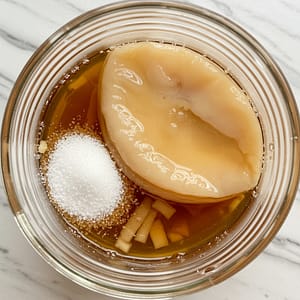- Home
- Kombucha

I. General Information
A. Scientific Name:
Symbiotic Culture of Bacteria and Yeast (SCOBY)
B. Alternative Names:
Tea mushroom, Manchurian mushroom tea, Immortal health elixir
C. Pronunciation:
/kɒmˈbuːtʃə/
II. Sourcing and Origin
A. Source:
Sweetened black or green tea.
B. Geographic Origin:
The exact origin is debated, but it is widely believed to have originated in Northeast China (Manchuria) around 220 BC.
C. Method of Processing:
A SCOBY is added to a mixture of brewed tea and sugar. The mixture is then left to ferment at room temperature for a period ranging from one to several weeks. During this process, the yeast ferments the sugar into alcohol, and the bacteria convert the alcohol into acetic acid and other organic acids, resulting in a fizzy, slightly sour beverage.
III. Properties and Uses
A. Physical Properties:
A light- to dark-colored liquid, often slightly effervescent, with a distinct vinegary smell. It can be clear or cloudy depending on whether it has been filtered.
B. Chemical Composition:
Contains organic acids (acetic, gluconic, glucuronic, lactic).
Rich in probiotics (Lactobacillus, Bifidobacterium, Acetobacter species).
Polyphenols and antioxidants from tea (catechins, flavonoids).
Small amounts of B vitamins (B1, B2, B6, B12).
Trace alcohol (usually <0.5% in commercial brews).
C. Primary Uses:
Skincare: Antioxidant and probiotic properties may support clearer skin and balance microbiome.
Haircare: Occasionally used in rinses for scalp health and shine.
Wellness: Supports gut health, digestion, liver detoxification, and immune balance; mild energizing effect from natural acids and B vitamins.
Culinary: Popular as a tangy, effervescent beverage; kombucha vinegar used in dressings and marinades.
Household: SCOBY can be repurposed for pet treats, composting, or DIY crafts (like vegan “leather”).
D. Key Benefits:
Supports gut health, provides antioxidants, and may have a positive effect on digestion.
IV. Safety and Considerations
A. Potential Allergies:
Individuals sensitive to caffeine, fermented foods, or yeast may experience adverse reactions.
B. Best Practices for Use:
Start with small amounts to assess tolerance. Choose unpasteurized varieties to ensure live cultures.
C. Special Precautions:
Generally safe when prepared hygienically.
May cause bloating or digestive discomfort in some people.
Home-brewed kombucha carries risk of contamination if not handled properly.
Not recommended for immunocompromised individuals, pregnant or breastfeeding women without medical guidance.
Contains small amounts of caffeine and alcohol.
V. Fun & Educational Facts
A. Historical Context:
Known as "the tea of immortality" in ancient China, it was highly prized by emperors for its health properties.
B. Did You Know?
The SCOBY grows with each batch of kombucha and can be shared with others to start their own brews.
C. DIY Recipe Idea:
Classic Kombucha involves brewing sweet tea and fermenting it. Popular flavorings include ginger, berries, and lemon.
